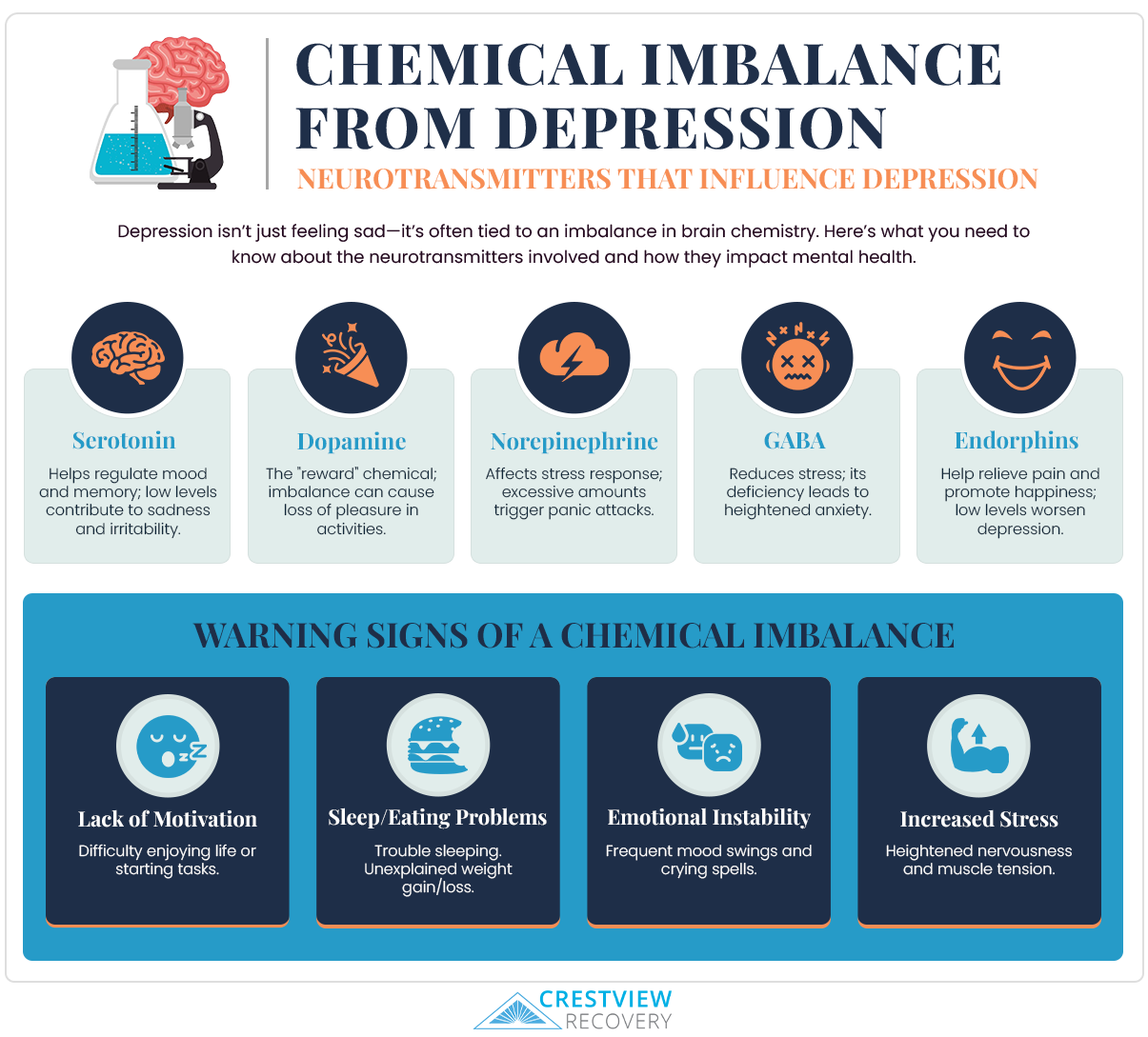Everyone is born with chemicals in their brain called neurotransmitters. Some of these neurotransmitter chemicals make us feel happier, and some make us feel more energetic. When we don’t have enough of some of these chemicals, we may feel tired, down, or lacking in energy. Some people even have a chemical imbalance. When this occurs, you may want depression treatment in Portland, Oregon to help you get through the rough spots. Call us today at 866.262.0531 for more information.

What Causes a Chemical Imbalance?
The primary chemicals in the brain that affect our mood and energy are as follows:
Serotonin
This neurotransmitter is partially responsible for how well you learn and remember things. It also is important in regenerating brain cells, which is part of keeping depression at bay. Researchers believe that a decrease in serotonin levels can cause a person to feel more tense, angry, depressed, or panicky.
Dopamine
This “feel-good” neurotransmitter is also the place where the brain gets its rewards. The dopamine connects a pleasurable experience with a reward memory so that you want to do that action over again.
Norepinephrine
This neurotransmitter is connected to your “fight or flight” response. This means that this chemical helps regulates your mood, stress, and anxiety. If you have too much norepinephrine, you may end up getting panic attacks.
GABA
This neurotransmitter helps with inhibitory functions in the brain. This chemical tries to keep everything in check and keeps you from feeling overly stressed. A decrease in GABA has been linked to feelings of anxiety and panic.
Endorphins
Endorphins are the “feel-good” chemicals that help relieve pain and make you feel happy. They work with dopamine to give you that sense of pleasure.
Symptoms of a Chemical Imbalance
People with a chemical imbalance may also experience other symptoms, such as:
- Anxiety
- Fatigue
- Insomnia
- Loss of appetite or overeating
- Memory problems
- Muscle aches and pains
- Unexplained crying spells
If you think you may have a chemical imbalance, it’s important to see a doctor or mental health professional. They can help you get the treatment you need to feel better.
Links Between Chemical Imbalance and Depression
A depression chemical imbalance would involve the dopamine and serotonin neurotransmitters since both of these involve the mood. People who have low levels of these chemicals may feel depressed.
It’s not uncommon for people who are struggling with depression to turn to drugs to balance out their mood. Drugs elevate the mood and work on the chemicals in the brain, making the person feel temporarily better. However, it’s only a quick fix, and it leads to greater problems in the end.
What Is Outpatient Mental Health Treatment?
 Also known as an intensive outpatient program, IOP care is a form of addiction treatment that allows patients to recover from their substance use disorder while still maintaining their personal and professional routine. This flexibility is one of its main advantages and makes it an excellent option for individuals already in recovery or whose addictions are not as severe as others.’ A patient can begin repairing the damage done while still in treatment, immediately building support in their circles and community. A few of the benefits of outpatient mental health treatment include:
Also known as an intensive outpatient program, IOP care is a form of addiction treatment that allows patients to recover from their substance use disorder while still maintaining their personal and professional routine. This flexibility is one of its main advantages and makes it an excellent option for individuals already in recovery or whose addictions are not as severe as others.’ A patient can begin repairing the damage done while still in treatment, immediately building support in their circles and community. A few of the benefits of outpatient mental health treatment include:
- Flexible scheduling
- Lower costs than residential treatment
- Ability to attend to at-home responsibilities
Whatever the true link is between substance use and depression, science and health professionals are certain that substance use can precede, cause, worsen, result from, or be completely distinct from bipolar disorder, but the combination makes diagnosis and treatment more challenging.
Treatment for Depression
The best way to treat a depression chemical imbalance is through therapy and medication. Therapy can help someone understand their thoughts and feelings and work through them in a healthy way. Medication can help to restore the balance of chemicals in the brain, making it easier for the person to manage their symptoms.
Treating depression oftentimes requires dual diagnosis treatment because people sometimes use drugs to offset their mood. At Crestview Recovery, medical professionals will be able to provide you with an accurate assessment as well as help create a treatment plan.
Our caring and compassionate staff is ready to help you on your journey to comprehensive healing. At our lovely facility, you will find a tranquil atmosphere that makes it easy to move forward on the path of hope. Trained clinicians will walk beside you while you journey to a new life. We use evidence-based therapies so you are sure to see results. Additionally, we offer a broad range of therapy options, some of which include:
- Cognitive-behavioral therapy
- Dialectical behavioral therapy
- Trauma therapy
- Family therapy
- Mindfulness meditation therapy
Don’t let a chemical imbalance drag your life down. You can overcome depression if you get assistance from a quality rehab center. Contact us at 866.262.0531, and we’ll guide you to the pathway of recovery.
































